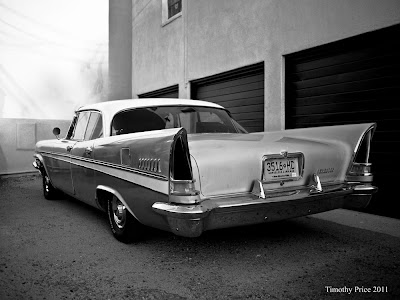I dropped Laurie off close to Woodward Hall, then I parked in T parking and made my way back to Woodward Hall in the wind. Along the way I came across an old finned car, some AXA parking graffiti, and a couple of art students blowing along in the wind. I also got a night shot of a bike that seems to be permanently parked by the SMLC building, and this morning's tulip, in color.
I still have to process tonight's lecture. Ms. Robinson was a fire ball, and lectured for over an hour without taking a breath. Her paper was interesting and she was entertaining, but she wore me out!
Last night's lectures were on the Arab influence of the acequias (irrigation ditches) in New Mexico and "Images of Muhammad in Medieval Jewish and Christian Literature."
The first lecture was interesting, but did not wholly convince me that the Arabs had all that much influence on the irrigation systems in New Mexico, other than contributing the word "acequia". The Romans had irrigation systems on the Ebro in Spain long before the muslim conquest in 711. There are decrees which cover the obligations, maintenance, checking compliance and imposing fines for infringements on people who irrigate that date back to the time of Hadrian. Since the Spanish didn't follow the "tribal" system for irrigation etiquette that the Arabs used, I would venture to guess that much of the Spanish rules for irrigation etiquette that were brought to New Mexico had their roots in the Roman decrees. I wanted to ask Professor Glick about it tonight, but he was preoccupied, and we had to leave.
"Images of Muhammad in Medieval Jewish and Christian Literature" was a fantastic lecture by Reuven Firestone from the Hebrew Union College. Jews, Christians and Muslims have canonized their scriptures and declared there are no more prophets — once scriptures are canonized new prophets threaten the established religions. Christ threatened Judaism, and Islam threatened both Judaism and Christianity; however, since the Christians had power and arms, they were in much better position to challenge Islam. Therefore, Christian writers were more inclined to write against Islam and Muhammad. Jews, who supposedly helped write the Qur 'an, were thought to put code into it that warned Jews that Muhammad was a false prophet and not to convert to Islam. There are letters in the Qur 'an that don't make sense, but can be decoded in Hebrew to mean "The sages of Israel advise the dumb wicked man".
One point that Professor Firestone made is that the reason the Muslims are so sensitive about the Qur 'an is that it's the miracle of Islam. Jewish prophets and Christ performed all kinds of miracles, but Muhammad performed none other than delivering oracles. The official Qur 'an was compiled in the 1930's in Egypt. The miracle is that all the words from God passed on through Muhammad were remembered, verbatim, 400 years after his death. A miracle indeed!





No comments:
Post a Comment